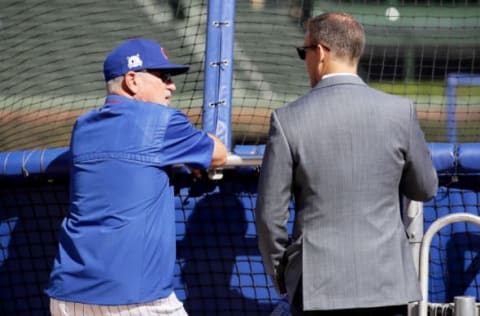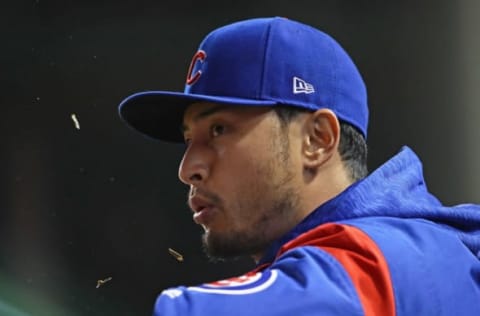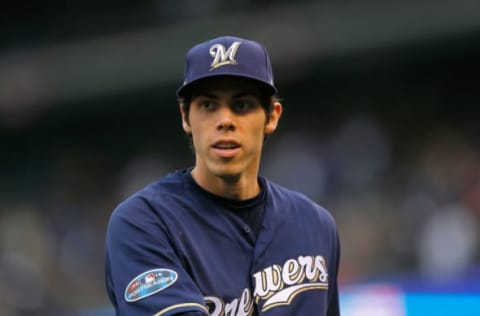Chicago Cubs were outplayed, outsmarted by the Brewers in last 12 months

We all know how the Chicago Cubs 2018 campaign ended. The path to that disappointed was paved by a front office that just didn’t get it done
First, let me say this: I love these guys. From the owner on down to the baseball operations leadership. I think this is the best run, best managed, best array of baseball talent of any Chicago Cubs team I have seen. And I have been following the Cubs since 1969.
They rebuilt the entire organization from top to bottom, which has led to the best stretch of Cubs baseball in over 100 years. So this is not an indictment of the entirety of their effort, nor a repudiation of their approach. But it is a specific critique of the last offseason and the need to right the ship.
After the 2017 season, the team jettisoned a raft full of Cubs coaches. Pitching coach Chris Bosio, hitting coaches John Mallee and Eric Hinske and third base coach Gary Jones, among others, were shown the door. Clearly, a change was in the air. The 2018 season would be different. It certainly was.
Cubs President of Baseball Operations Theo Epstein said many things after the end of the 2018 season. He said Joe Maddon‘s status remains unchanged, that the offense broke and that they will shift from evaluating talent to evaluating performance.
That last part caught my attention. Whose performance, exactly? At least, initially, we got an answer when they fired hitting coach Chili Davis shortly after the conclusion of the season.

Chicago Cubs: Outsmarted from the start
Taking all that into account, Epstein and the folks in the front office need to look in a mirror because they were totally pantsed by the Brewers front office this past offseason. Totally. This isn’t just a criticism of Theo Epstein, Jed Hoyer or Jason McLeod, but the whole analytics group who are supposed to be the smartest guys in the room.
Say what you will about the injuries, the schedule in September or off-field domestic abuse revelations related to a key player. Those are factors that cannot be anticipated or controlled. Yes, there were the mid-season moves that brought Cole Hamels, Jesse Chavez and Daniel Murphy.
These were great adjustments by the front office. But they were, in fact, necessitated by the errors made during the offseason. So let’s look at the acquisitions made by the Cubs and Brewers in the run-up to the 2018 season.

Chicago Cubs: Starting pitching proved a stark difference
The Cubs front office knew that with Jake Arrieta leaving, they had a big hole in the rotation. And John Lackey‘s departure meant that 40 percent of the starting rotation needed to be replaced.
More from Cubbies Crib
- Cubs starting pitching has been thriving on the North Side
- Make no mistake: the Cubs are very much about power hitters
- Cubs are giving pitcher Javier Assad a deserved shot
- Cubs: It’s time to start thinking about potential September call-ups
- Cubs: P.J. Higgins deserves to be in the lineup on a daily basis
The Brewers also faced challenges around starting pitching heading into 2018. Matt Garza never met their expectations (any Cubs fan could have warned them) and was exiled to the bullpen and was granted free agency after the 2017 season. Jimmy Nelson was injured last September and eventually required surgery (he never pitched in 2018).
Each team went into postseason knowing what they needed. The Cubs pursued and signed 31-year-old Yu Darvish (six years; $126 million), despite a significant injury history, and 28-year-old Tyler Chatwood (three years; $38 million). We know how that went.
The Cubs also looked at Jhoulys Chacin but for whatever reason found him a less attractive option. The Brewers signed Chacin to a two year, $15.5 million contract. Chacin went on to post a 15-8 record and a career-best WHIP (1.163). The Brewers also signed Wade Miley (one year; $2.5 million). Miley spent time on the DL but eventually finished with a 2.57 ERA and a 1.215 WHIP.
It’s not even close. The Brewers spent a fraction of what the Cubs did on free agent starting pitching ($10.25 AAV vs. $34 million AAV), for far fewer years, and with spectacularly better results.

Chicago Cubs: Who’s in left?
What if in November of 2017 I told you there was a 25-year-old Gold Glove left fielder who slashed .290/.369/.432 through 2017, and you could get him for next to nothing? Like for instance three A-ball minor leaguers and a light-hitting outfielder with -0.2 WAR? And that he would cost under $11 million per year over the next four years of his contract? You’d say done deal, right?
Well, that’s what Milwaukee gave Maimi to get Christian Yelich. The Cubs looked at Yelich, but again who knows what they were thinking. Maybe that Kyle Schwarber would lose fifty pounds and grow three inches too? And if Kyle Schwarber wins a Gold Glove in left field I’ll pay his mortgage for a year.
The Brewers then added Lorenzo Cain, with his 290/.342/.421 slash line through 2017. The former Royals outfielder then went on to post career-best numbers for batting average and OBP in 2018 while compiling a 6.9 WAR. And at five years/$80 million ($16 million AAV) he’s not Bryce Harper expensive either.
Through all of this, the Cubs broke camp with just two additions to their non-pitching roster. They signed 32-year-old Efren Navarro who was released in June, and 35-year-old catcher Chris Gimenez, who they traded in August for another 35-year-old catcher, Bobby Wilson.
Next. Are the Cubs still favorites to win the division next year?. dark
This offseason awaits
The Cubs front office has their work cut out for them. Whatever sabermetric analytics they conjured up the last offseason, it was wrong. Very wrong. The Cubs can not stand still while the teams around them get better. Every day must be focused on improving the product on the field.
And sure, they could sign Harper and Manny Machado. But any casual fan can do that. You don’t need to spend millions of dollars on an analytics department and scouting to do that. The challenge is to find next year’s Chacin, Yelich, or Cain. Yes, Theo, it IS time to start evaluating on performance–and that includes your own front office.